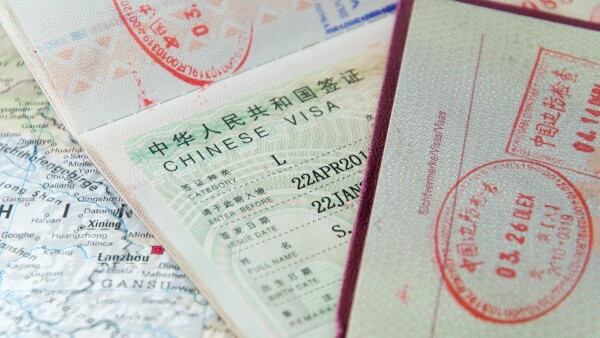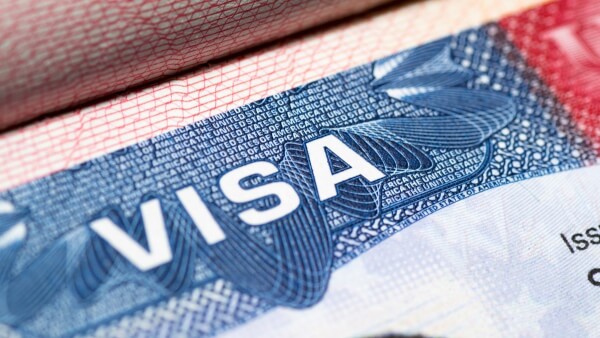Chinese visa invitation letter (UK guide): How to write and apply
If you are travelling from the UK to China soon, whether to visit family and friends or for business, you may need an invitation letter from your host. This...

Thinking of taking the leap and moving abroad from the UK? You might be drawn to living somewhere with more sunshine, lower living costs or simply a fresh start. While this could be an exciting and life-changing experience, it does require careful planning.
In this guide, we’ll walk you through how to move abroad from the UK. We’ll highlight the best places to emigrate to from the UK, explain the visa and residency requirements and provide an estimated timeline to help you plan your move.
We’ll also show you a cost-effective way to manage your money across borders. With the Wise account from the money services provider Wise, you can send, spend and convert money in 40+ currencies at great mid-market exchange rates and low, transparent fees*. It’s not a bank account but offers some similar features, and your money is safeguarded.
Looking to take your savings with you? Wise can also help you with large transfers.
Learn more about the Wise account
| Table of contents |
|---|
Let’s begin by covering the main steps for moving abroad from the UK:
If you're not sure where you'll be moving yet, start with some initial research to help narrow down your options. Look into factors like the cost of living, climate and overall quality of life in potential destinations.
Since every country has its own visa schemes, it’s important to check which one you qualify for. Typically, you’ll have options like a work visa, study visa and some type of family visa.
If you plan to work when you move, it’s important to know the job market of your new country. Take the time to explore which careers are currently in demand, what the salary averages are for your field and whether there are any skill shortage lists.
If you’re aiming for a work visa, the next step is to secure a job and start the visa application process. Sometimes your employer is the one that’s responsible for your application, so make sure you provide him with all the necessary information.
Contact your local council and let them know you’re moving abroad so you can cancel your Council Tax. They’ll ask for a forwarding address, so it’s important to have at least a temporary one ready.¹
It’s also important to inform HMRC about your move abroad, but how you do this depends on whether you usually file a Self Assessment tax return.
If you do, you’ll need to:
If you don’t normally file a Self Assessment, you should:
Look through some online listings and try to find someplace to live. A good starting point is researching average rent prices and the size of security deposits in your new country, so you can factor these into your overall costs. If you feel like you need help, don’t hesitate to consult a real estate professional.
You’ll likely need to explore both public and private health insurance options. In some countries, travel and health insurance are also required as part of your visa application, so this step may come earlier.
A local bank account should be one of your first steps once you officially move abroad. You’ll need it for everyday expenses, paying rent and transferring money from the UK. You might be able to keep your UK bank account after relocating, but it’s best to check with your bank.
You can also consider opening a Wise account to manage your money in multiple currencies across borders.
To avoid accidentally bringing prohibited items or going over duty-free limits, make sure to check customs and import rules.
Moving can be a lot to handle, so a professional moving company is a great investment. You can pack your most valuable items yourself and have them help you with the rest, including bulky furniture and larger household items that are difficult to transport on your own.
The first steps of leaving the UK should start at least a year before you move. There’s a lot to take care of, so we’ve broken down the process into chunks to help you navigate it.
Twelve months before your move, make sure you’ve chosen a destination and checked the validity of your passport. It’s also important to explore all visa options and decide which one you’ll apply for, giving you time to collect the necessary documents. Since the moving process can be expensive, try to create a financial plan.
Six months before departure, start researching the job market and, ideally, secure a position. If you’re currently employed in the UK, inform your employer about your plans to leave. You should also find at least temporary accommodation, as you’ll need to give the local council a forwarding address. This is also a good time to contact your bank and see if they have international banking options.
Three months before leaving, you should explore healthcare options securing coverage. Notify HMRC of your move and fill out the required forms. As your departure date gets closer, set an exact travel date and find flight tickets. Once that’s finalised, reach out to moving companies to get quotes and start planning furniture shipping.
Finally, one month before moving abroad from the UK, make sure you’ve cancelled all subscription services and utilities. Pack your essential belongings and find an exact date for the moving company to assist you with the rest. At this stage, review your checklist to ensure nothing has been overlooked.
Here’s a leaving the UK checklist to sum everything up:

If you’re wondering, “Where can I move to from the UK?”, the good news is that your options are nearly unlimited. Any country that allows immigration generally accepts UK expats, so you’re unlikely to be restricted from applying in any way.
While some countries have stricter requirements, it’s still possible to make the move.
The best place to move depends on what you plan on doing once you relocate. People emigrate for various reasons, such as pursuing education, seeking a lifestyle change, reducing living costs or working abroad.
These are the most popular countries for UK expats:³
Ireland is one of the easiest countries for UK citizens to move to, thanks to the Common Travel Area (CTA). UK citizens don’t need a visa, so you can work and study there freely. Since there’s no language barrier, it’s also easier to settle in and integrate.⁴
The amount you’ll need depends largely on the cost of living in your destination country. It’s a good idea to have enough savings to cover at least a few months of living expenses.
Initial costs typically include visa fees, flights and moving expenses. If you’re planning to invest in private health insurance, be sure to factor that into your budget as well.
Visa options and residency criteria vary from country to country. Let’s go through some examples for countries popular with UK expats.
For example, if you’d like to move to the EU, there are several ways to obtain residency, such as through investment, starting a business, obtaining a work visa or marrying an EU citizen. To become a permanent resident, you’ll typically need to live in the country for at least five years.⁵
You can settle in Australia through various permanent residence visa options, such as the family-stream, work-stream or investor-stream visas. The family visa is designed for applicants with partners, children or dependent relatives who are Australian citizens or permanent residents. The work-stream visa is for those with Australian employers.⁶
You can permanently move to New Zealand by obtaining a resident visa and, eventually, a Permanent Resident visa. A resident visa allows you to live in New Zealand indefinitely, but it comes with some travel restrictions. After holding a resident visa for two years, you can apply for the Permanent Resident visa.⁷
The most common way to move to the USA is with the immigrant work visa, particularly the EB-1, EB-2 and EB-3 visas. However, to become a permanent resident, you must obtain a Green Card. You can get it through employment or family sponsorship, but also by applying for the Green Card Lottery.⁸
There are over 100 routes for moving to Canada, including the Express Entry option for economic class skilled workers, the Start-up visa and family class sponsorship programmes. Many Canadian provinces and territories, such as Quebec, have their own immigration systems.⁹
Foreigners moving to Singapore can obtain permanent residency through various routes, such as marrying a Singapore citizen, holding an Employment Pass or S Pass or investing in Singapore. Factors that are taken into account are your family ties to Singapore, age and economic contributions.¹⁰
The only visa category for moving to Thailand permanently is the non-immigrant visa. There are ten subcategories, based on the purpose of your stay. If you extend your visa for at least three years, you can apply for Permanent Residency.¹¹
Residence visas for moving to Dubai can be valid for up to three years if they’re sponsored or up to ten years if they’re unsponsored.¹² The available work visas are the Green visa, Standard work visa and Golden visa.¹³
You might be wondering – Can I lose my British citizenship if I live abroad? The good news is that you can live outside the UK for as long as you want and you won’t lose your citizenship.¹⁴
You can only lose your UK citizenship if you renounce it voluntarily or if it gets revoked by the government under specific circumstances, such as involvement with terrorism or serious criminal activity.¹⁴

Moving abroad from the UK comes with financial challenges that you’ll need to address. These include setting up bank accounts, dealing with taxes, organising estate matters and managing pensions.
If your provider allows you, you can keep your UK bank account overseas. However, you won’t be able to transfer money in or out of your Individual Savings Account (ISA) while abroad, unless you or your spouse are Crown Employees.¹⁵
Having an offshore account, or a non-resident bank account, can come in handy for savings and investments. This allows you to manage multiple currencies in one place, so you don’t have to switch to a new bank if you move. However, make sure to explore different providers, since exchange rates and account costs can vary.
Your residency status determines whether you’re liable for UK taxes. If you spend more than 183 days in the UK during a tax year, you’ll be considered a resident and will pay tax on your worldwide income. Non-residents are only taxed on UK-sourced income.¹⁶
If you’re a resident in two countries, it’s important to look into double taxation agreements the UK has with some countries to avoid being taxed twice.¹⁶
At the time of writing, the UK does not have an exit tax.¹⁷
You can claim your UK State Pension abroad if you’ve paid enough UK National Insurance contributions. While your pension might change now that you’re no longer living in the UK, the exact change depends on where you move.¹⁸
If you’re moving to and retiring in the EEA, Switzerland or Gibraltar, you’ll receive an annual increase to your State Pension. You’ll also get an increase if you live in a country that has a social security agreement with the UK, except for Canada and New Zealand. In all other cases, your pension will remain frozen.¹⁸
Your State Pension can be paid into either your UK bank account or your local account in your new country.¹⁸
| 💡 Read more: What is a Qualifying Recognised Overseas Pension Scheme (QROPS)? |
|---|
When moving abroad, UK expats should update their estate plan to avoid unexpected taxes. If you plan on buying property or taking out a mortgage abroad, factor these into your estate plan, since this can impact taxes. Consulting an estate planner might be a good idea to ensure everything’s in order.
Before moving abroad, you’re likely to have lots of costs to cover. Some of these, such as real estate costs, visa application fees and rental deposits, will need to cross borders and can get expensive because of the transfer fees and exchange rate markups.
Open a Wise account and you can send money between the UK and 140+ countries in 40+ currencies for low, transparent fees* and the mid-market exchange rate. It's not a bank account but offers some similar features and your money is always safeguarded.
| Here’s an overview of the main benefits of using Wise: |
|---|
|
**Capital at risk. In the UK, Interest and Stocks are provided by Wise Assets — this is the trading name of Wise Assets UK Ltd, a subsidiary of Wise. Wise Assets UK Ltd is authorised as an investment firm and regulated by the Financial Conduct Authority (FCA). Our FCA number is 839689. We do not give investment advice, and you may be subject to pay tax. If you're not sure, seek qualified advice. You can find more information about the funds on our website.
Sources used:
Sources last checked on date: 26-May-2025
*Please see terms of use and product availability for your region or visit Wise fees and pricing for the most up to date pricing and fee information.
This publication is provided for general information purposes and does not constitute legal, tax or other professional advice from Wise Payments Limited or its subsidiaries and its affiliates, and it is not intended as a substitute for obtaining advice from a financial advisor or any other professional.
We make no representations, warranties or guarantees, whether expressed or implied, that the content in the publication is accurate, complete or up to date.

If you are travelling from the UK to China soon, whether to visit family and friends or for business, you may need an invitation letter from your host. This...

Explore the pros and cons of living in Andorra as a UK expat, including facts about the country, the best places to live in Andorra and more.

A guide on how to write an invitation letter for a US visa, covering the format and essential details to include.

Life as an expat comes with multiple financial decisions. Learn all about expat wealth management in our guide.

Everything you need to know about moving to Turkey from the UK. Read about visas, popular expat destinations, healthcare and more.

Everything you need to know about moving to Costa Rica from the UK. Read about visas, popular expat destinations, healthcare and more.